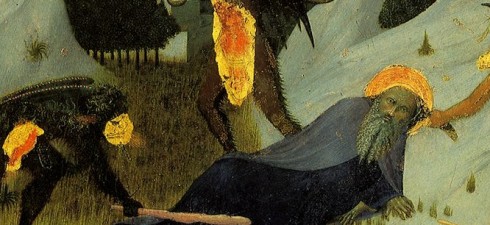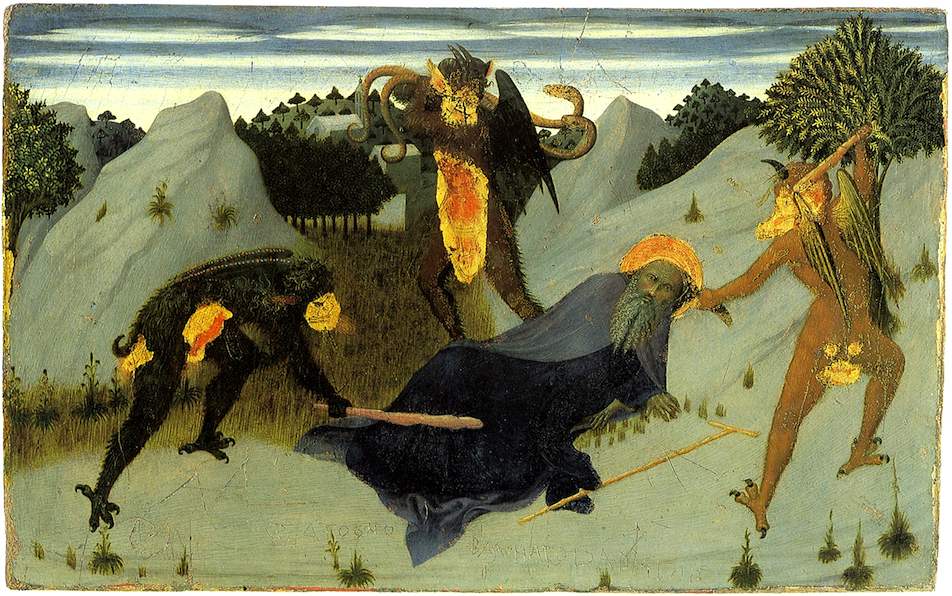“Things as certain as Death and Taxes, can be more firmly believ’d: The Devil not have a cloven foot! I doubt not but I could, in a short Time, bring you a thousand old Women together, that would as soon believe there was no Devil at all; nay, they will tell you, he could not be a Devil without it, any more than he could come into the Room, and the Candles not burn blue, or go out and not leave a smell of Brimstone behind him.”
-Daniel Defoe, The History of the Devil
Benjamin Franklin made the association of certainty, death and taxes famous, but Defoe said it first. It was a passing point in his case for why the Devil most certainly uses fanciful images such as a cloven-foot to his advantage … that such images make it possible for the human mind to grasp and hold a belief in devilish things while simultaneously mis-comprehending the source of such devilishness. To extemporize on Defoe: “they will believe in a simple, magical and shadowy deception, while the truth of it continues unchallenged in the broad daylight of human commerce.”
Defoe believed in the devil. And while he chides the common people for naively seeing only a mirage, he also affirms the reality of a being who deceives us and operates in direct opposition to the work of God in this world. I am tempted to write just as reproachfully of his views but this would diminish Defoe’s larger point; one that remains just as truthful today as it was when it first appeared in the introduction to History of the Devil:
“Bad as he is, the Devil may be abus’d, Be falsely charg’d, and causelesly accus’d, When Men, unwilling to be blam’d alone, Shift off these Crimes on Him which are their Own.”
“Don’t blame it all on the devil” seems a reasonable enough point for mature minds. Maybe too obvious a point? It’s tempting to take all of this at face value and assume that Defoe’s meaning is simple, but I’d like to suggest something further …
What if we agree to take all the responsibility for devilishness in this world to ourselves? Not too difficult, and it seems to me that the world has moved strongly in this direction. And how about the good? Are we ready to also stop scapegoating our guilt at being both brutish and goodly? Does any god or devil deserve credit for the human propensity-the godly ability-for love and hate?
Have we arrived at a point where the scapegoats of our superstitions can be set free?
If not yet, when?
[photo credit: Sassetta – St Antony beaten by the devils, via Wikimedia Commons]


Just today I was asking a first grader why he didn’t do his spelling homework, he told me that it was his dad’s fault. For some reason, even at age six people are already displacing blame. Haven’t yet heard a kid say – I just didn’t want to do it or it wasn’t important to me so I forgot it or I had more fun playing the wii. I’m really the one to fall for the trap because. . . it’s rhetorical to ask right?
I like to blame people too. And like my first grader it’s usually my parents, because they really messed me up – the devil has nothing on parents really, does he? Sometimes I like to blame the church or the culture I was raised in. I guess you are really a grown up when you finally realize . . . I was free all the time to choose but scared of the possible consequences or just hadn’t learn a different way of living yet. Mostly now I’m wishful, I wish I had a more liberal upbringing which included more tolerance and love than punishment and guilt.
I can see why people do like to blame their life and choices on a mystical horrible mean beast with hooves and horns, you wouldn’t want to blame a soft fluffy sad-eyed bunny would you? I’ll have to teach the 6 year olds to really explore their creativity, because that dad excuse is just plain boring compared to that.
Angie, I really enjoyed this comment. Thank you. Taking it to the personal responsibility level is where all the power is, I think, so what you’ve said here really rings true to me. Though I’m not sure children are free to choose in the same way mature adults are, I do think that at some point we have to take responsibility for our current reactions and choices even if we were in fact harmed by our parents and other institutions while still under their spell. When the mind matures to a point that the spell is broken, this is when we get our chance, I think.
In this sense, the continued reliance on mythical beings to scapegoat ourselves is a maturity-blocking force. It keeps us submissive like children … and funny that the church explicitly calls-out such child-like submission as a virtue and the opposite as a vice. Do we truly believe the world would be better off like this?
Lol at teaching children creativity. :D And isn’t that exactly what we’re doing when we teach them they are subject to mythical beings?
So once we set free the devil from being a scapegoat, what do we get – ?
This? http://www.youtube.com/watch?v=pcJwz7wu8_s
Andy, is that an Imaginarium clip? It’s blocked for playback in the US. What’s the clip title? Maybe I can search for it elsewhere.
lol, this one was one you’ll be familiar with, I think: Tenacious D/’Tribute’.
I hate it when Youtube is blocked… that’s one of the reasons I don’t use YouTube links in my posts more often. :(
PS. Sounds good to me.
PPS. Or this: http://www.youtube.com/watch?v=yod51lr3F0U&feature=fvw
Angie and Matt,
I taught my children to make decisions, listing the pros, and cons and then considering the consequences, immediately, 5 years, long term, and eternal. The extrapolation of this is that we have very few trials in our life, that we didn’t choose, and very little opportunity to blame the devil for the consequences of our decisions.
When you choose to get married you choose to have a certain amount of marrital discord which you can develop strategies to reduce. When you choose to have children, you choose to have teenagers in a few years time, and so can develop strategies to prepare for this.
Most of our problems are not the devils fault but the consequences of our decisions. There are of course exceptions like illness or disability, but again, can you blame the devil for those?
I always cringe at the blaming of the devil and eve in the temple. I’m sure eve and adam would have discussed it and decided the best way to go forward.
I also cringe pretty much whenever I hear someone blame the devil. It seems like we give the devil way too much credit–he’s always mucking around in everybody’s business. We give him the power to push someone’s car off the road when they’re on the way to the temple, we give him the power to tempt us to . . . fill in the blank. Seems way too convenient to me to blame our bad decisions or the whims of Mother Nature on an abstract evildoer.
So long as I understand that “the devil” is just a term I use to refer to my own, internal beast — the thing I have difficulty controlling, understanding, etc because it’s so primal … you know, it lives in my lizard brain. Then I’m fine with blaming the devil. But when I externalize onto a super-human being, then I think I’ve become too much the victim and submit myself too much to the whims of whoever is defining the nature of this being. “The devil made me do it” or even “god made me do it” become ways of scapegoating aspects of myself.
It seems to me that the more we do this the less hope we have of ever understanding and embracing our true nature.
Thank you, Geoff. Good points. I’m sure much if it is our bitter disappointment at unintended consequences and/or the fallout of our ignorance. I’m absolutely certain that I did not consider marital discord when deciding to marry. But I found out about it and had to decide (again!) what it’s worth. Same with the kids. Fortunately, nature gives us lots of value to temper us through the ignorance.
Which reminds me — I didn’t choose to have a sex drive. Funny how that kind of thing so often gets blamed on the devil and not god. Adam and Eve’s apple. It’s perhaps more about the kind of knowledge that is self-awareness. “Look how I can’t control my appetites!” “That’s not me!” “That’s certainly the devil.” And it is … it’s our most primal beast. But it’s still us.
I would like to thank you for your post it really helped me out on my report.
Hi! I just wanted to ask if you ever have any trouble with hackers? My last blog (wordpress) was hacked and I ended up losing many months of hard work due to no back up. Do you have any methods to prevent hackers?
I discovered your blog site on google and check a number of of your early posts. Continue to maintain up the excellent operate. I just further up your RSS feed to my MSN News Reader. Searching for ahead to studying extra from you in a while!…